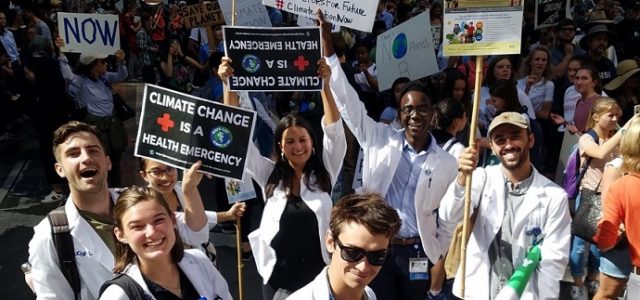Richard Tutton
To mitigate the spread of SARS-CoV-19, governments have forced far-reaching changes to our early 21st century lives. Many of the things people value and enjoy doing – shopping, tourism, watching sport, even having drinks with friends – have been all but suspended. In their place have come new patterns of life, a dramatic drop in air pollution, traffic levels, noise, and reports of a revival of wildlife. This has led some to contemplate that, out of the current loss of lives and livelihoods, this emergency could be the catalyst of positive future change.
Even the BBC, in its Newsnight programme, speculated on the need for a new ‘social settlement’ that addresses the entrenched social and economic inequalities and their existential threats, which the Covid-19 emergency have once again exposed. However, this search for positive outcomes from the current crisis should not stop at social or economic reforms at a national level. When the final reckoning is made of what has happened, we need to recognize that the emergence of SARS-CoV-19 is part of a broader pattern of emerging diseases associated with changes to ecosystems that humans in the Anthropocene are bringing about.
In other words, we must understand and respond to the emergence of SARS-CoV-19 not only as a public health emergency, but also as part of the wider planetary health emergency that both academics and activists have addressed in relation to environmental change. Only by acknowledging this, can we hope to build towards that better future.
The field of planetary health has emerged in the past three years as an interdisciplinary endeavour to better understand the relationship between human societies and the ecosystems on which they depend. As the editors of The Lancet Planetary Health journal put it in its April 2017 inaugural issue: ‘Planetary health [..] aims not only to investigate the effects of environmental change on human health, but also to study the political, economic, and social systems that govern those effects’. The field has grown significantly, with various medical schools and research centres advancing teaching and research in this area.
Researchers in the field recognize that along with other recent viruses of note, such as Ebola or SARS-CoV, SARS-CoV-19 is the latest ‘zoonotic spillover event’ from a non-human mammal. Evidence indicates that in the past sixty years, 60% of emerging infectious diseases have originated in non-human animals, with almost three quarters of those from wild rather than domesticated animals. This appears to be on the increase in recent decades. In their recently published study, Johnson and colleagues observe that such increases are the result of ‘human encroachment into habitats high in wildlife biodiversity and hunting of wild animals’.
David Quammen – author of Spillover: Animal Infections and the Next Human Pandemic – is more straightforward in his provocatively titled New York Times piece ‘We made the coronavirus epidemic’: ‘We invade tropical forests and other wild landscapes, which harbor so many species of animals and plants — and within those creatures, so many unknown viruses. We cut the trees; we kill the animals or cage them and send them to markets. We disrupt ecosystems, and we shake viruses loose from their natural hosts. When that happens, they need a new host. Often, we are it.’
As such, alongside climate change, habitat loss, species extinction, chemical pollution, viral zoonoses should feature in how we imagine and debate social futures in the Anthropocene, the name given to our current era in which humanity (or at least a certain section of humanity), through economic and sociotechnical activities, has become a geophysical force with far-reaching impacts across both space and time.
These viral zoonoses result from our entanglement with other species. This has gained recognition in medical anthropology, for example, where new critical engagement with questions of health in the Anthropocene start with acknowledging that ‘humans also shape and are shaped by our caretaking, consumption, manipulation, destruction of, and compassion for, other beings’.
Looking to the future, we can be confident that many societies will find ways to move out of the current emergency through physical distancing and managing the spread of the virus in a way that does not overload healthcare systems, though many more will surely die and suffer as this happens. However, the conditions that produced the emergence of SARS-CoV-19 are not set to change, at least in the medium term. As Quammen puts it, these conditions include ‘7.6 billion hungry humans: some of them impoverished and desperate for protein; some affluent and wasteful and empowered to travel every which way by airplane’. Pandemics then are a product of our interdependent but highly unequal world, which humans are reshaping in ways that produce unintended consequences.
We cannot simply rely on science to develop vaccines and treatments to get us out of future pandemics. Instead, the pathway to making a better, fairer world that some can now sense in this current crisis, must involve global cooperation to mitigate the effects of habitat and biodiversity loss. Only by acting collectively to better care for other beings and respect planetary boundaries, do we stand a chance of decreasing the chances of future pandemics arising from viral zoonoses. When the postponed UN Conferences on Biodiversity and on Climate Change re-convene in 2021, this must be high up on their agenda. From this crisis then comes an opportunity to address the planetary emergency like never before.
This means that political leaders should stop relying on the language of war and talk of ‘defeating the virus’ and recognise instead that only by enacting policies that nurture planetary health can a more positive future emerge.
Richard Tutton works in the Department of Sociology and in the Science and Technology Studies Unit (SATSU) at University of York, UK. His current research examines future imaginaries and notions of ‘futurelessness’ in the context of the planetary emergency.
Image: Bennett Kissel, UCSF Medical Student.
